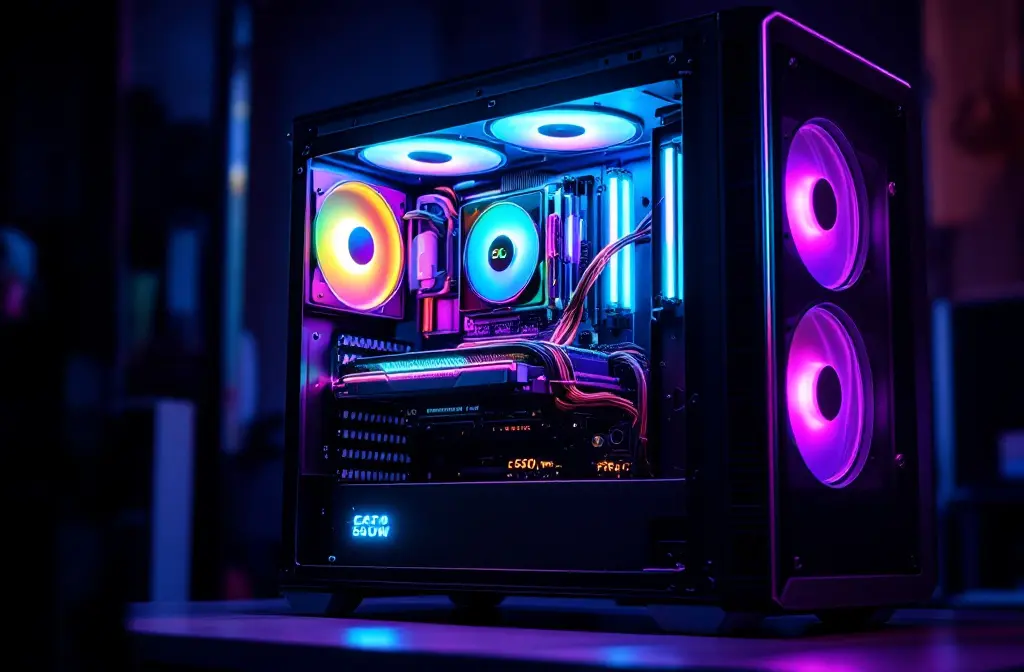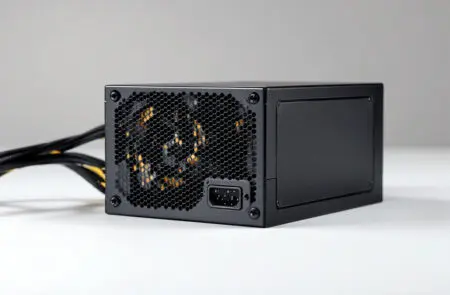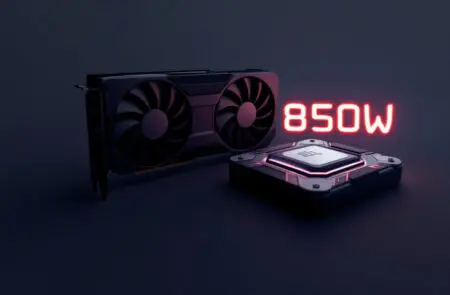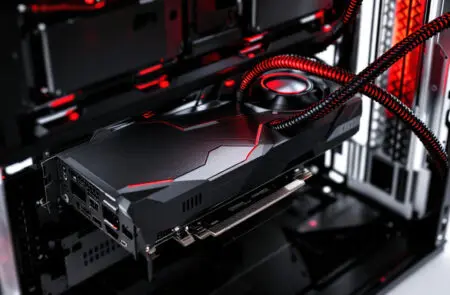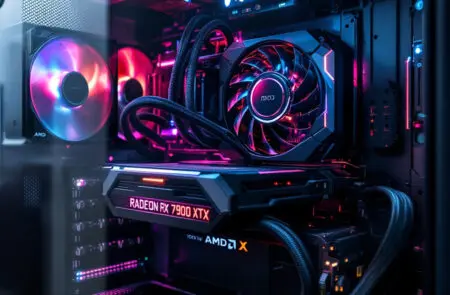There’s a unique thrill that comes with building a new gaming PC. You spend weeks, maybe even months, researching the perfect graphics card, agonizing over which CPU offers the best bang for your buck, and picking out a case that screams you. It’s a labor of love. But then you get to the power supply unit, the PSU, and for many, the analysis paralysis kicks in.
It’s not as flashy as a GPU or as headline-grabbing as a CPU, but it’s the unsung hero that brings your entire rig to life. Get it wrong, and you’re in for a world of hurt. This leads to one of the most common questions I see on forums and in my DMs: Is a 650W PSU enough for gaming?
And it’s a great question. The recommendations are all over the map. You’ll see tiny 500W units and absolute monsters—1200W behemoths that could probably power a small town. Here’s the truth: there’s no single right answer. But for a massive number of gamers, a 650W PSU isn’t just “enough.” It’s the sweet spot. It all comes down to understanding what your machine actually needs, not what the marketing tells you to buy. So let’s cut through the noise and figure out if 650 watts is the magic number for your rig.
More in Power Supplies Category
What is The Best Power Supply For an AMD Radeon RX 7700 XT
Key Takeaways
- For Most Gamers, Yes: A high-quality 650W PSU is more than sufficient for the majority of mid-range gaming builds, which represent the bulk of the market.
- The GPU is the Deciding Factor: Your graphics card is the single most power-hungry component in your system. Its requirements will largely dictate your PSU needs.
- Don’t Just Look at Watts: PSU efficiency (80 Plus rating), build quality, and whether it’s modular are just as important as the wattage number for system stability and longevity.
- Headroom is Smart: You never want your components to draw the maximum rated wattage of your PSU. Aiming for your peak load to be around 50-70% of the PSU’s capacity is ideal for efficiency and stability.
- When in Doubt, Calculate: Online PSU calculators are invaluable tools for getting a reliable estimate of your specific system’s power draw before you buy.
So, What Exactly Does a Power Supply Unit (PSU) Do Anyway?
Look, before we talk numbers, you have to get what the PSU is actually doing in there. Seriously. Think of it as your PC’s heart. The power coming out of your wall outlet is alternating current (AC). That’s great for your lamps, but it’s completely unusable for the delicate components inside your PC. Your motherboard, CPU, and GPU all need stable, predictable direct current (DC) at very specific voltages.
The PSU’s entire job is that conversion. It’s a huge deal.
It takes that high-voltage AC power from the wall, filters it, and transforms it into the clean, stable DC power that every single part of your rig needs to function. It’s a transformer, a regulator, and a safety net all rolled into one unassuming metal box. Every bit of performance, every frame rendered, every victory screen, is made possible because the PSU is silently and reliably doing its job. Without it? Your thousand-dollar pile of high-tech parts becomes a very expensive paperweight.
Why Is Choosing the Right Wattage So Dang Important?
Picking a PSU is a total Goldilocks situation. You don’t want too little power, and you don’t necessarily need too much. Finding the “just right” wattage is the key to a happy, stable gaming experience. Stray too far in either direction and you’re just asking for problems, either right away or down the line. It’s one of the most fundamental choices you’ll make for your new PC.
What Happens If My PSU Is Too Weak?
This is a lesson I learned the hard way. On my very first PC build back in college, I poured all my money into the GPU and CPU. I thought I was a genius. I skimped on the power supply, grabbing some generic 450W unit that was on sale. The machine booted up, and I thought I had gotten away with it. Then I tried to play Crysis. About ten minutes into a firefight, my screen went black. Total system shutdown. No warning, no blue screen. Just… nothing.
That’s the classic symptom of an underpowered PSU. When your components, particularly your GPU, ramp up under a gaming load, their power demand spikes. If the PSU can’t provide the juice they’re asking for, its self-preservation instincts kick in. It shuts down to prevent damage. This can show up as:
- Random shutdowns or reboots, especially during intense gaming sessions or when running benchmarks.
- System instability, like freezing or the dreaded Blue Screen of Death (BSOD).
- Failure to boot up in the first place if the initial power draw is too high.
- In the worst-case scenario, a cheap, overloaded PSU can fail catastrophically, potentially taking other expensive components out with it.
Trust me, you don’t want to troubleshoot random crashes for a week only to realize your PSU was the culprit all along.
Can My PSU Actually Be Too Powerful?
So, if too little power is a disaster, should you just buy the biggest, baddest 1200W PSU you can find and call it a day?
Not so fast.
While an overpowered PSU won’t harm your components—your PC will only draw the power it needs—it’s not a very smart move for a couple of reasons. First, it’s a waste of money. A quality 1000W PSU can cost significantly more than a quality 650W or 750W unit. That’s cash that could have gone toward a faster SSD, more RAM, or a better graphics card.
Second, and more technically, it’s about efficiency. Power supplies are most efficient when they’re operating at 50-80% of their maximum rated load. This is known as the “efficiency curve.” If you have a 1000W PSU in a system that only draws 300W while gaming, your PSU is operating at only 30% load. It’s far outside its peak efficiency range. This means it’s pulling more power from the wall than it needs to and generating more waste heat. It’s like using a sledgehammer to hang a picture frame. It works, but it’s wildly inefficient.
Let’s Talk Components: Who Are the Biggest Power Hogs in Your Rig?
To figure out if 650W is enough, you need to know where all those watts are going. Your PC is a team of components, but not everyone on the team has the same appetite for power. A few key players are responsible for the vast majority of your system’s energy consumption.
The Graphics Card (GPU): The Undisputed King of Consumption
Here it is. The big one. The Graphics Processing Unit is, without a doubt, the thirstiest component in any modern gaming PC. This is the part that’s doing the heavy lifting, rendering gorgeous, high-fidelity worlds at silky-smooth frame rates. All that computational muscle requires a tremendous amount of electrical power.
The power draw of a GPU can vary wildly depending on the model. For example, a mainstream card like an NVIDIA GeForce RTX 4060 might have a Total Graphics Power (TGP) of around 115W. In contrast, a high-end beast like the GeForce RTX 4080 can easily pull over 320W under load. The top-of-the-line RTX 4090 can spike to 450W or even more. Bottom line: your GPU choice dictates your PSU needs more than anything else. A 650W PSU can handle the RTX 4060 with tons of room to spare, but it would be dangerously insufficient for an RTX 4090.
The Central Processing Unit (CPU): The Brain with an Appetite
While the GPU is the king, the CPU is the powerful prince right beside it. The Central Processing Unit handles all the game logic, physics, AI, and system operations that make your game run. Modern CPUs, especially those with high core counts and aggressive clock speeds, can be quite power-hungry.
An efficient mid-range processor like an AMD Ryzen 5 7600X or an Intel Core i5-14600K might pull around 100-150W at full tilt. However, if you step up to a top-tier chip like an Intel Core i9-14900K, you could be looking at a power draw of over 250W, especially if you get into overclocking. Your CPU choice is the second most important factor after the GPU.
What About Everything Else? (Motherboard, RAM, Fans, etc.)
Thankfully, the rest of your components are much more reserved. Your motherboard, RAM sticks, SSDs, and case fans all need power, but their collective draw is tiny compared to the two titans above. You can typically budget around 50-75W for all of these ancillary components combined. Even a full suite of flashy RGB fans and light strips won’t add a massive amount to the total. While you can’t ignore them, they rarely make the difference between needing a 650W PSU and an 850W one.
The Magic Number: When is 650W the Perfect Fit for Gaming?
Now we get to the heart of the matter. We know what a PSU does and who the power hogs are. So, for what kind of gaming PC is a 650W power supply the ideal choice? The answer, for a huge portion of the PC gaming community, is the ever-popular mid-range build.
Are You Building a Solid Mid-Range Gaming PC?
Let’s build a hypothetical—but very common and powerful—gaming PC for 1080p or 1440p gaming.
- CPU: AMD Ryzen 5 7600X (Peak Power: ~105W)
- GPU: NVIDIA GeForce RTX 4060 Ti (Peak Power: ~160W)
- Motherboard, RAM, SSD, Fans, etc.: (Let’s budget a generous ~75W)
Let’s do the math. 105W + 160W + 75W = 340W. This is a rough estimate of the total power your system would pull if every single component were stressed to its absolute max at the exact same time, which almost never happens in real-world gaming. Even in this peak scenario, a 650W PSU is only running at about 52% of its capacity. This is perfect!
You’re right in the middle of that peak efficiency curve, meaning your PSU is running coolly and effectively. You also have over 300W of headroom to account for any unexpected power spikes and to ensure your PSU isn’t being strained, which helps it last longer. For this kind of mainstream, high-performance rig, a 650W PSU isn’t just adequate; it’s optimal.
How Can I Be Sure 650W is Enough for My Specific Parts?
While our hypothetical build is a great example, you want certainty for your own expensive components. Thankfully, you don’t have to guess. There are excellent online PSU calculator tools that do the work for you. Sites like PCPartPicker have a built-in wattage estimator that automatically calculates the power draw of the components you add to your list. For a more detailed analysis, the OuterVision Power Supply Calculator is another fantastic resource.
When I was planning my most recent upgrade, I used one of these calculators religiously. I plugged in my exact CPU, my new GPU, the number of fans I was using, my SSDs—everything. The calculator gave me an estimated load wattage of around 380W. Based on that, I knew my trusty 650W Gold-rated PSU was still the perfect tool for the job. It gave me the peace of mind to click “buy” without any lingering doubt. I highly recommend you do the same.
When Does a 650W PSU Start to Sweat?
Of course, a 650W unit isn’t the right choice for every build. It’s a fantastic option for the mainstream, but if your ambitions lie in the highest echelons of PC performance, you’re going to need to bring more power to the party. There are a couple of clear scenarios where 650W simply won’t cut it.
Are You Planning on a High-End GPU Like an RTX 4080 or 4090?
If you’re building a top-tier, no-compromise 4K gaming machine, you’re going to be using top-tier components. As we discussed, a card like the RTX 4080 or 4090, or AMD’s equivalent like the RX 7900 XTX, has an enormous appetite for power. A single RTX 4090 can pull 450W all by itself. When you add a high-end CPU and other components, your total system draw can easily exceed 600W.
This is where you absolutely need a more powerful PSU, typically in the 850W-1000W range. It’s not just about the sustained wattage, either. These powerful cards are known for having very high “transient spikes”—split-second power demands that can be double their rated TGP. A robust, higher-wattage PSU has the capacitors and delivery systems needed to handle these spikes without shutting down. Trying to run an RTX 4090 on a 650W PSU is a recipe for constant, frustrating system crashes.
Do You Dream of Extreme Overclocking?
Overclocking is the art of pushing your CPU and GPU to run faster than their factory settings. It’s a hobby for enthusiasts who want to squeeze every last drop of performance out of their hardware. This process, however, comes at a cost: a big increase in power consumption and heat. Pushing more voltage through a component to achieve a stable overclock can dramatically raise its power draw. If you plan on doing any serious overclocking, that comfortable headroom you had with your 650W PSU will evaporate quickly. For an enthusiast build focused on overclocking, moving up to a 750W or 850W PSU is a wise investment to ensure stability.
It’s Not Just About Watts: What Else Should I Look For in a PSU?
Choosing a power supply based on wattage alone is a rookie mistake. The quality of that power is just as, if not more, important than the quantity. Two 650W PSUs can have wildly different performance, reliability, and safety features. Here’s what else you need to consider.
What Do Those 80 Plus Ratings (Bronze, Gold, Platinum) Actually Mean?
When you shop for a PSU, you’ll see a sticker that says “80 Plus” followed by a metal: Bronze, Silver, Gold, Platinum, or Titanium. This is an efficiency certification. It tells you how efficiently the PSU converts AC power from the wall into DC power for your PC. No conversion is 100% perfect; some energy is always lost as heat. An 80 Plus Bronze PSU is guaranteed to be at least 82% efficient at 20% load, 85% at 50% load, and 82% at 100% load. An 80 Plus Gold unit, by comparison, must be 87%/90%/87% efficient at the same loads.
What does this mean for you? A more efficient PSU, like a Gold or Platinum rated one, wastes less energy. It runs cooler, quieter (because its fan doesn’t have to spin as fast), and will save you a little bit of money on your electricity bill over time. For any gaming PC, I strongly recommend a PSU that is, at minimum, 80 Plus Bronze certified. An 80 Plus Gold unit often represents the best balance of price and performance. As a resource, the University of Illinois has published information on the importance of efficient power management in computing, underscoring the value of these ratings.
Does a Modular PSU Make My Life Easier?
This is less about electrical performance and more about your sanity as a PC builder. PSUs come in three flavors:
- Non-Modular: All the cables are permanently attached to the PSU. You get a big octopus of wires, whether you need them all or not.
- Semi-Modular: The essential motherboard and CPU cables are attached, but the optional cables for GPUs, SSDs, etc., are detachable.
- Fully Modular: Every single cable is detachable. You only plug in the ones you absolutely need.
I’ll never build with a non-modular PSU again. My first build, the one with the weak PSU, was also non-modular. The inside of my case was a chaotic rat’s nest of unused cables I had to cram into any available space. It choked airflow and looked terrible. My current rig uses a fully modular PSU, and the difference is night and day. Cable management was a breeze, the interior is clean, and the airflow is unobstructed. A semi-modular or fully modular PSU is worth every extra penny for the vastly improved building experience.
Why Shouldn’t I Just Buy the Cheapest PSU I Can Find?
Please, please, please do not buy a cheap, no-name power supply. The PSU is connected to every single component in your computer. If it fails, it can send incorrect voltages surging through your system, frying your motherboard, your CPU, your GPU—everything. A well-built PSU from a reputable brand (like SeaSonic, Corsair, EVGA, be quiet!, etc.) has crucial safety features like Over Voltage Protection (OVP) and Short Circuit Protection (SCP) that a budget unit might lack. This is the one component you should never, ever skimp on. Buying a quality power supply isn’t just an expense; it’s insurance for your entire investment.
So, What’s the Final Verdict on a 650W PSU?
After all this, we come back to our original question: Is a 650W PSU enough for gaming? For a massive number of PC gamers, the answer is an enthusiastic and resounding yes.
If you are building a sensible, powerful, mid-range gaming PC designed to deliver incredible experiences at 1080p or 1440p, a high-quality, 80 Plus Gold rated, modular 650W power supply is not just enough—it’s the perfect choice. It provides ample power for mainstream CPUs and GPUs, operates at peak efficiency, and offers enough headroom for stability and peace of mind without wasting your money on unnecessary overhead.
However, it’s not a universal solution. If your ambitions involve a top-of-the-line graphics card for 4K gaming or a deep dive into the world of extreme overclocking, you will need to look at 850W or beyond.
The power to choose correctly is now in your hands. Assess your components, use a PSU calculator to confirm your numbers, and invest in a quality unit from a trusted brand. Do that, and you can build with the confidence that your rig’s heart is strong, stable, and ready for years of gaming adventures to come.
FAQ – Is a 650W PSU enough for gaming
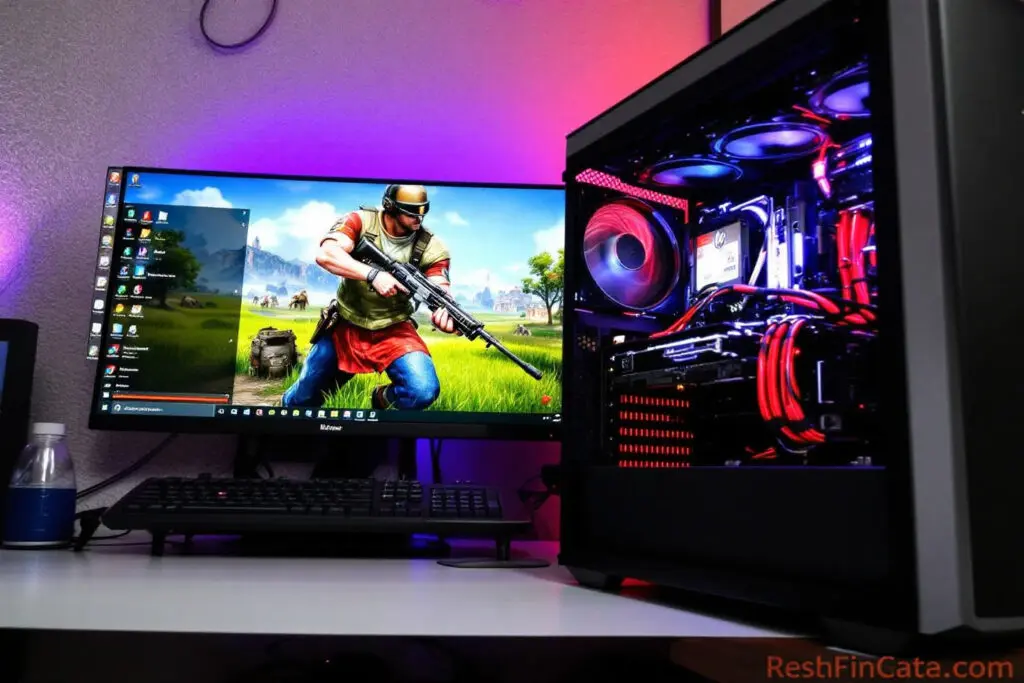
What features should I consider besides wattage when selecting a PSU?
Important factors include efficiency ratings like 80 Plus Gold or Platinum, modularity for better cable management, build quality, safety protections such as Over Voltage Protection (OVP), and the reputation of the brand. These features ensure reliability, safety, and ease of building.
Can a PSU be too powerful for my gaming setup?
While a more powerful PSU won’t harm your components, it can be inefficient if operated well below its peak capacity. It is more cost-effective and efficient to choose a PSU that matches your system’s power draw closely, typically within 50-80% of its rated wattage.
What risks are associated with choosing a PSU that is too weak?
Using an underpowered PSU can lead to system crashes, random shutdowns, freezing, or failure to boot, as well as potential damage to components if the PSU cannot meet the power demand during high loads.
What components primarily determine the wattage needs of my gaming PC?
The graphics card (GPU) is the most power-hungry component and largely dictates your PSU requirements. The CPU also significantly impacts power needs, while other components like motherboard, RAM, and SSDs consume comparatively less power.

